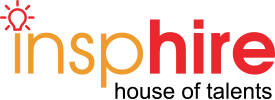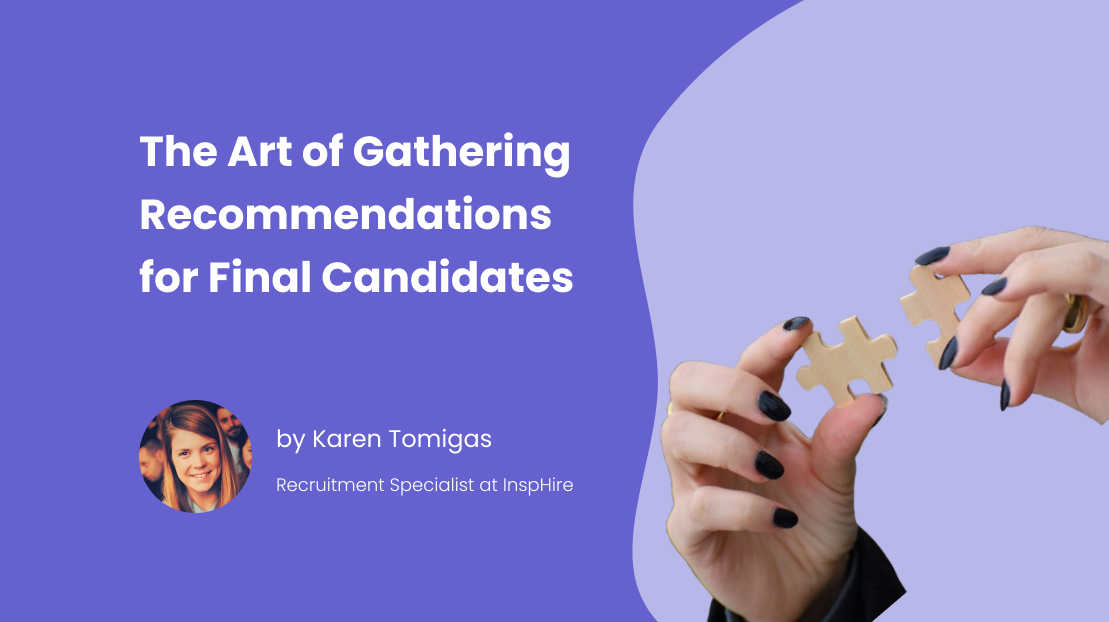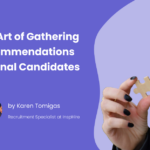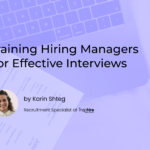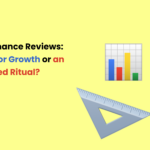By Karen Tomigas
In the hiring process, gathering recommendations is more than a formality—it’s the holy grail. Throughout the entire recruitment process, we assess a candidate’s professional fit—from years of experience to tech stack, education, and past roles. But none of this tells me anything about the person’s character. How does an employee handle pressure and resistance? How do they cope with failures? What happens when someone “moved their cheese”?
Every personality entering my organizational “family” must align with its cultural character. Of course, some of this is already covered in the HR interview, but there is a gap between how a candidate perceives themselves and how their manager sees them.
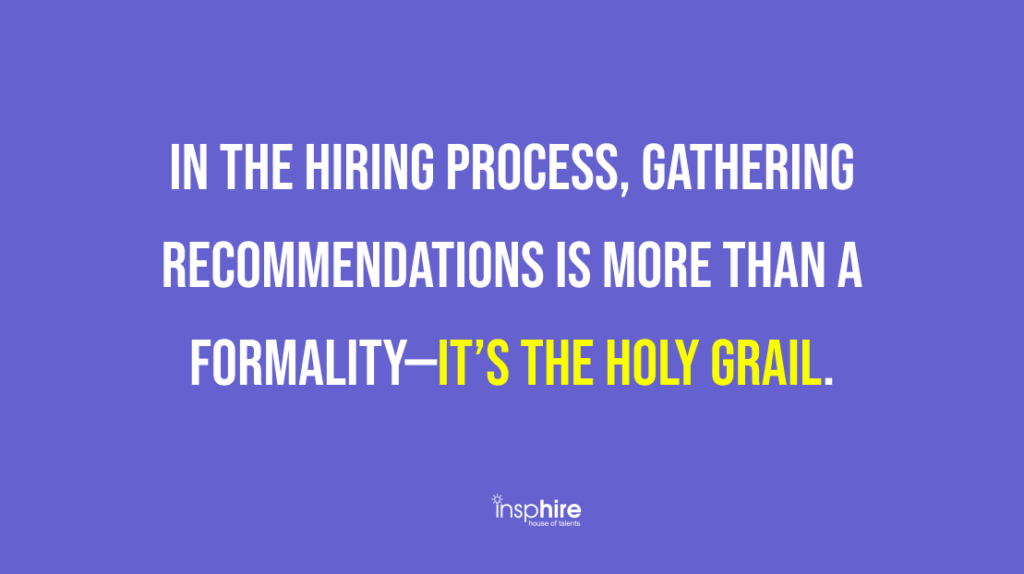
To be honest, the impact of this aspect on the process is significant—generations ahead. If a candidate was not a professional fit, they can reapply in two years, improve, and get accepted. But if a candidate receives a recommendation that doesn’t align with the organization’s character, in the vast majority of cases—it’s a lost cause forever.
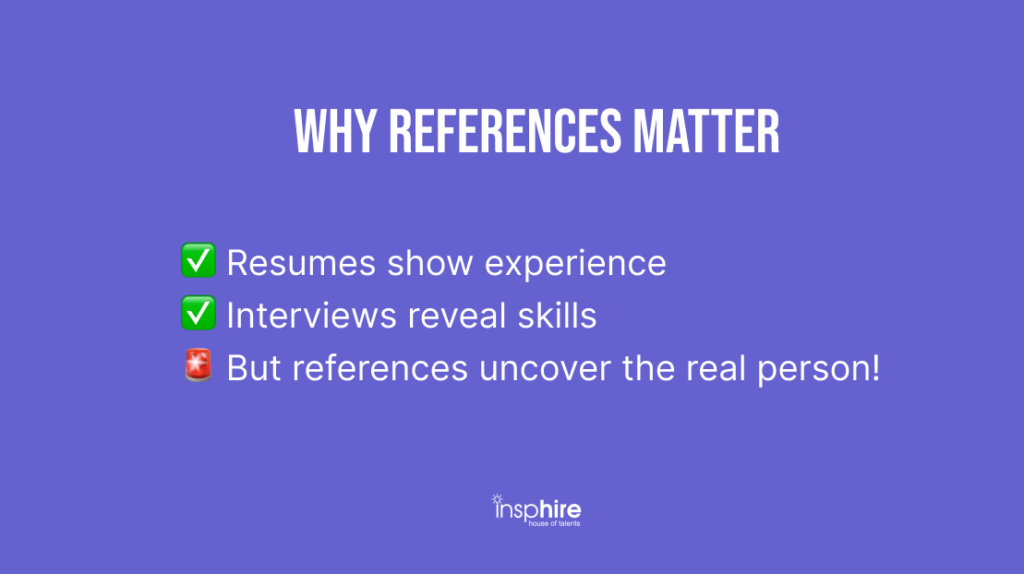
When and How to Ask for Recommendations
I bring up the topic of references as early as the first interview—when I explain the steps of the process to the candidate. However, I go into more detail during the HR interview, which I wrap up with, “The next step will be reference checks,” so the candidate can start preparing them—letting them know that we will be reaching out.
I reinforce this by requesting a LinkedIn profile link—I don’t go searching on my own. I don’t have time to waste, and I don’t know many recruiters who do. If a candidate doesn’t have references? They’ll simply disappear, won’t send them, or will suddenly “move forward with another company.”
That’s exactly why I emphasize this as early as the first phone call—so if that’s the candidate’s plan? They do it upfront, before meeting hiring managers, C-levels, and other executives.
But if you go searching for nonexistent references or fake companies on LinkedIn, you’re just wasting your time—playing Inspector Gadget.
Who Makes the Best References?
After completing an HR interview, I let the conversation settle in my mind. What concerns arise? What do I want to verify? I connect the individual to the criteria my hiring manager set from day one—what is he looking for in an employee? What kind of manager will the direct supervisor be? What kind of person is he? How will their connection work? How will they integrate with the other teams?
If I sense that the candidate is shy or less communicative, I request a reference from both a manager and a colleague—I want to understand their role in the company and within the team.
As part of HR, it’s crucial to me that every new employee quickly feels like part of the family, connects with their teams, and has lunch buddies.
On the professional side, I dive deep into the day-to-day responsibilities of the role.
- Analyst teams? They provide services to the whole company—so I ask for a colleague from a department that relied on their work.
- Last role as a freelancer? I ask to speak with a real client.
- Junior candidate? I love speaking with research advisors—they provide incredible insight into learning processes. It’s critical that juniors demonstrate a history of improvement, adaptability, and handling shifting priorities.
The Key Question: Did the References Address My Concerns?
And, most importantly (this happens a LOT!): Is this reference even reliable?
What Makes a Good Reference?
Oh, now we’re getting to the really important part—recruiters, listen up!
Yes, some managers are unpleasant, have problematic personalities, are full of ego, and, most importantly—don’t know how to hire employees.
📌 Case in point: I once spoke to a startup CEO who spent the entire call cursing his employees. Completely trashed them. He was irrelevant to me. I threw the entire conversation in the trash and asked for a different reference. If he speaks like this about employees he hired himself, how can he possibly provide meaningful insights for their next manager?
📌 Another example: A reference from a manager at a notoriously old-fashioned company. I asked how the candidate handled working with colleagues who weren’t as meticulous or strong as they were. She smugly replied, “We don’t have employees like that.” That answer screams one of two things:
1️⃣ A manager who doesn’t listen to their team.
2️⃣ A reference who isn’t being honest (or just doesn’t care to engage).
🚨 Recruiters must remember: References don’t work for your company. Most of the time, they have no real incentive to give you their full attention. You have to read between the lines.
Because yes—bad managers exist. They’re not some untouchable Sacred Cow.
Crafting the Right Questions
On a macro level, I divide references into:
🔹 The Father – The manager
🔹 The Son – The colleague
🔹 The Holy Spirit – The organization
I always ask candidates about the most positive and negative experiences they’ve had with each of these—this gives me a framework. That’s one of my constants.
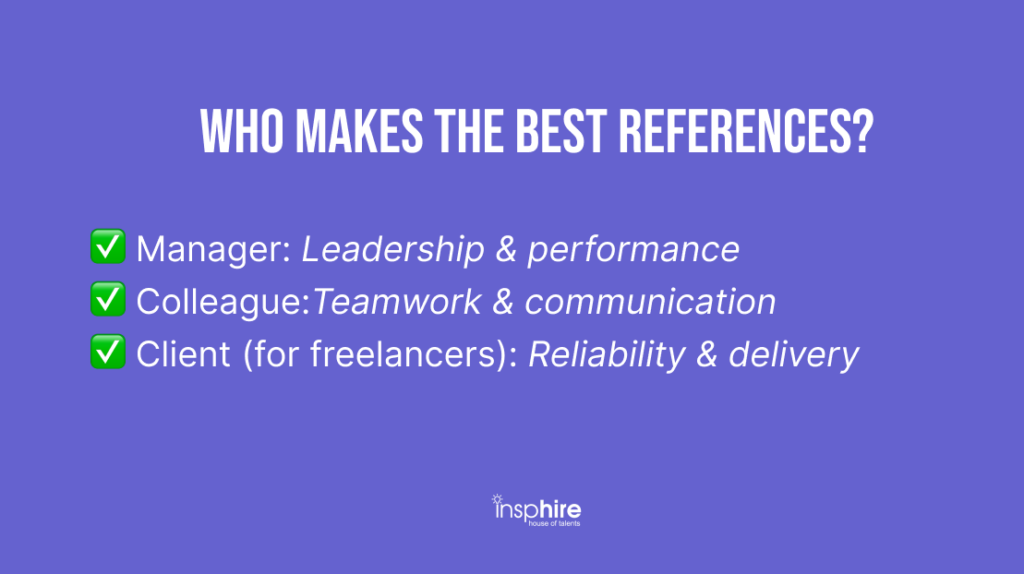
How I Build My Questions
I start writing my questions during the HR interview, paying attention to subtle nuances. I jot down notes on what to focus on and from there, I begin formulating my reference-checking questions.
Then, I cross-check insights from all interviews, including my own:
✔ What did I feel in my first conversation with the candidate?
✔ What atmosphere did they create?
✔ What came up in the hiring managers’ interviews?
✔ Not just weaknesses—what strengths were highlighted?
For example, precision, organization, and perfectionism are often seen as positives. But is it obsessive precision? Is this someone people enjoy working with? Do they understand priorities? Can they adapt like a chameleon to the diverse workforce? Are they patient with production delays? Do they grasp the pressure in the creative department? Do they remember to remind CS to send the presentation to the client?
Reference Calls: A Conversation, Not an Interrogation
It’s critical to talk to candidates and references like a human being, not like a robotic recruiter. No “Question. Answer. Question. Answer.”
Instead, I approach it like talking to a friend who’s telling me about the new guy she’s dating. I listen, engage, and stay curious.
🔹 What does that mean?
🔹 How did it play out?
🔹 How did you feel about it?
🔹 How did he react?
🔹 And then what happened?
🔹 How did he handle it?
🔹 Did he take initiative?
Expanding, discussing, and truly listening makes all the difference.
Verifying the Information
First Stop: LinkedIn vs. Resume
✔ Cross-check dates.
✔ Review the profiles of listed managers—do the dates align?
✔ Was the listed manager actually their supervisor at that time?
✔ Did they manage them for a significant period?
✔ If not—why did the candidate choose them?
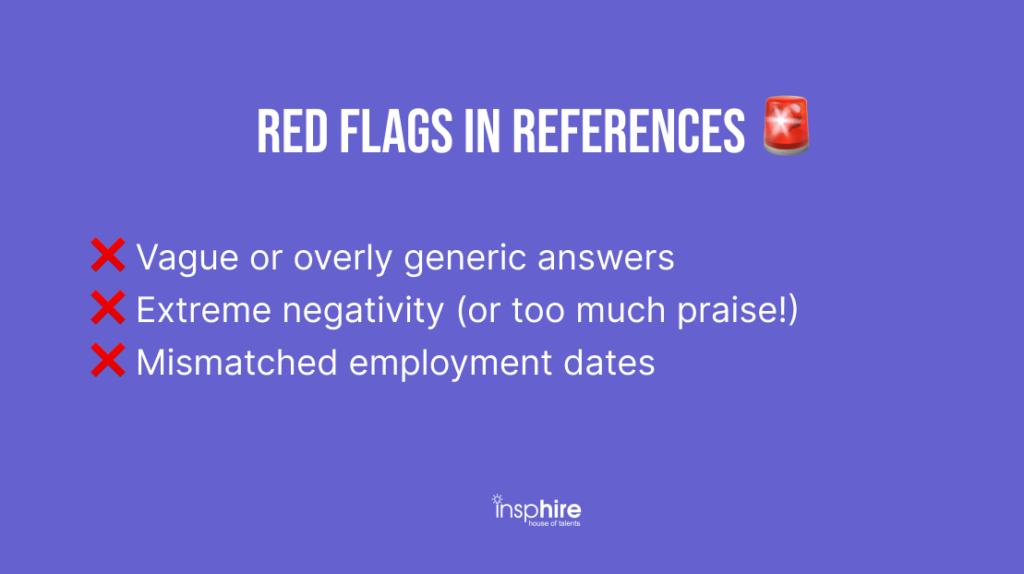
Final Thoughts
Gathering recommendations isn’t just about ticking a box—it’s a crucial step in ensuring that a candidate is the right fit for the organization, both professionally and culturally. By approaching reference checks with curiosity, strategy, and intuition, recruiters can make hiring decisions with greater confidence. After all, a great hire isn’t just about skills—it’s about finding someone who will thrive in the company’s unique environment.
InspHire is a 360° HR company taking a unique approach of specializing in building and improving HR processes and recruiting for global internet companies. Our approach and industry experience equipped us with deep knowledge and understanding in the world you work in. We cover every aspect of HR services that your company needs, from direct hire placements to trainings, employer branding, and welfare programs.
